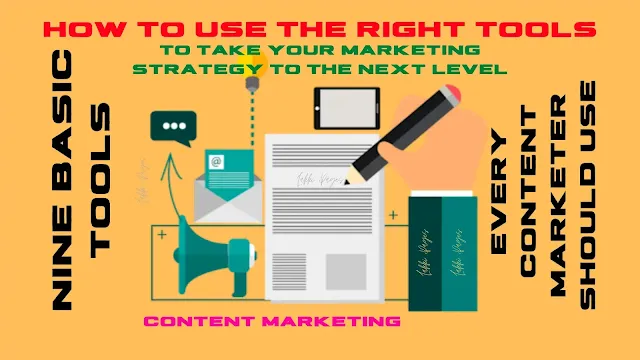Nine Basic Tools Every Content Marketer Should Use. Search accounted for 65% of total e-commerce sessions in 2019, and retail sales in the Global e-Commerce Market are expected to reach $4. 89 trillion this year.
More than half of the search e-commerce sessions were organic searches, according to Statista figures. And that organic search is driven by Seo-driven Content Marketing.
However, for this content marketing to be effective, Marketers have to do more than just post on the company's blog. They have to reach their customers where they are and work to drive traffic back to their site.
But with the seemingly endless supply of Marketing Tools out there, it can be difficult to figure out which is the best use. Tool fatigue is real, and it can overwhelm even the most experienced marketers.
As a Content Marketer, I've already seen how the right tools can take marketing strategy to the next level.
To help you avoid tool fatigue and give a starting point as you decide which tools you will use to bolster your marketing efforts, I have short-listed nine of the most important categories of content marketing out there, along with some tips. Make sure you make the right choice.
Read more about: Facebook Free Advertising Method
1. Content Management System (CMS)
WordPress is probably the most popular CMS, and that is totally free but many solutions allow you to organize online content and access as many partners as you need to create, edit and publish content. HubSpot's CMS is one of them but it's a paid CMS.
A good CMS will have a backend editor that makes it possible to create content on the site without the need for a coding expert.
It should also offer SEO features, such as the ability to create clean URLs, offer redirect URLs, and include Page Titles, Meta Descriptions, and Image ALT text.
2. Customer Relationship Management System
According to LinkedIn, 65% of sales professionals use a CRM. CRM is used to manage company relationships and interactions with customers and prospects to improve those relationships and ultimately close more businesses. Several companies offer CRMs, including Salesforce, HubSpot, and Marketo.
Find a solution that offers contact management to keep users and prospects at bay. It should also have lead tracking, which makes it possible to track leads from any type of engagement to the point of sale.
Marketing automation is another area where CRM can be of great help. According to a HubSpot survey, 61% of high-performing leaders use CRM to automate parts of the sales process.
Automation can free up sales and marketing to focus more on finding and securing new leads and less on management tasks.
3. An Email Marketing Platform
Popular Email Marketing Strategies, In fact, HubSpot found that by 2020, e-mail engagement has seen an 80% increase in marketers. That's why email marketing platforms such as MailChimp, HubSpot, or Marketo are indispensable tools.
A good email marketing platform will offer CRM integration that will allow you to manage customer and prospect information and track key metrics, such as click-through and open rates.
Mobile-friendliness is another important feature that can have a direct impact on the success of your email marketing campaigns. According to HubSpot, 46% of emails come from mobile devices. It shows how important it is to work well on mobile and for email.
4. A Marketing Automation System
In a survey from Marketing Profs, 92% of marketing agencies reported spending more time, resources, and budgets on marketing automation integration.
Automation software, such as those offered by Purdot and HubSpot, can automate many aspects of marketing, including social media, email, and lead generation. Ideally, it should be easy to use and integrate with your other tools.
Since custom marketing automation systems can be difficult to develop and run, make sure the solution you choose provides the best customer support.
5. A Marketing Key Performance Indicator Tracker
KPIs are the most important metrics against which your marketing strategy is being formulated. Pre-built trackers are available, but you can also bring your own marketing PI tracker spreadsheet template, which we have chosen to do.
Our template allows us to track the key metrics that affect our marketing and sales teams and how they work together. Some of the metrics included are inbound and outbound monthly recurring revenue, contact form submissions, monthly cell calls, and closed sales.
Such a pre-made template will work in a wide range of businesses. But if you have unique KPIs that your company is measuring against success, the best way is to create your own template.
6. Project Management Software
Project management software is used for project planning, scheduling, and resource allocation. Asana, Monday, and Trello are just a few options. These platforms allow teams to share, manage and manage individual project standards and budgets.
You can also create your own project management software that suits your specific needs, this is the job we have chosen.
A good project management system will allow you to assign responsibilities to teammates and yourself so that your team can keep track of what to do and when to do it.
Make sure your project management software enables your team to leave comments and notes related to specific tasks that everyone can see. This means staying on the same page for everyone and making sure that no aspect of a project is wasted or miscommunicated.
7. Design Software
Design software such as Canva or Adobe Creative Suite - both of which are used - is an important element of content marketing. With the right design tools, you can ensure that your content doesn't look like everyone else's and attracts the attention of your audience.
The software of your choice should have the appropriate level of customization based on your team's needs and design experience. If your team is less experienced with design, you will need to choose a platform that offers templates and drag-and-drop functionality.
On the other hand, if you want to create more customized designs with a team with graphic design experience, you'll be more likely to use a platform like Adobe InDesign or Illustrator.
8. Analytics Software
According to HubSpot, the majority of marketers report how their campaigns directly affect revenue. To properly report, you need analytics software.
This allows you to monitor the performance of your website and your marketing efforts. Also, without analytics software, you won't have good data to insert into this easy marketing PI spreadsheet mentioned earlier.
Google Analytics is probably a popular tool, but there is much more available. Choose a tool that has a user-friendly interface and blends in with your other content marketing tools.
9. A Social Media Management Platform
SEMrush reports that 94% of marketers distribute content. With such a large number, it is safe for me to assume that you do too. A social media management platform makes this distribution much easier, providing a more efficient way to create and schedule posts across different social channels.
HubSpot, HootSuite, and Buffer are some of the other popular tools, and they will all work to get the job done.
When deciding between tools, choose one that has a strong scheduling option. Scheduling allows your team to create and schedule social posts in batches that run live at different times of the week.
A good social media management platform will also allow you to review the performance of your social posts, including impressions and clicks.
You may have noticed that when listing the most important types of marketing tools, many similar brands keep coming back.
This is because many companies recognize the value of having an important platform that can fulfill a variety of marketing functions. This approach can reduce costs and streamline your organization.
For example, we primarily use a combination of HubSpot products and our own proprietary software. However, every case is different, and a unified platform may not be right for you.
When choosing your tools, look carefully at your options, and take into account your company's unique needs, your team's specific dynamics, and your company's strengths and weaknesses.
From there, you can put together a set of marketing tools that will help you achieve your goals and create a new business.






0 Comments
⛔ Please do not enter any spam links in the comment box.